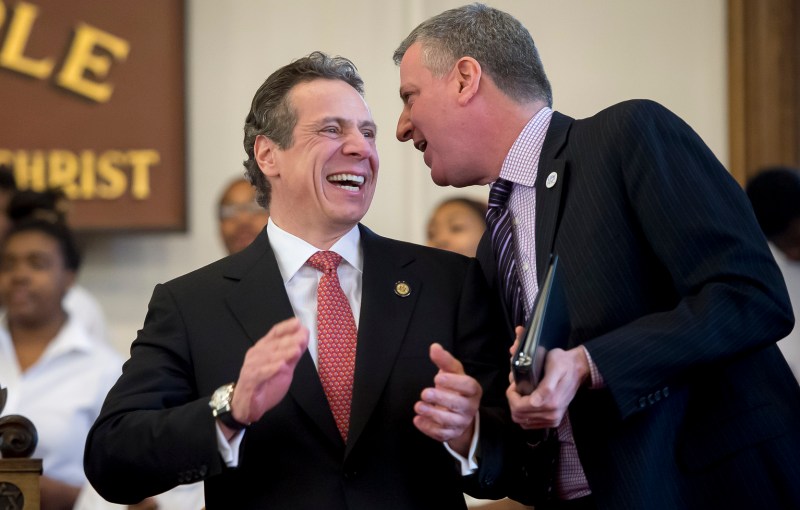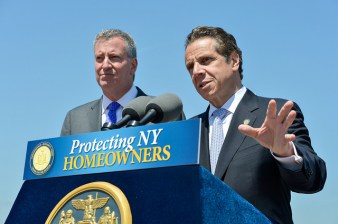On MTA Reform, De Blasio Gave Cuomo Everything — And Got Nothing In Return
Don't forget: Governor Cuomo still owes the MTA $7.3 billion.

Mayor de Blasio is apparently so eager to get the MTA off his hands, he’s giving the keys to the kingdom to Governor Cuomo without even putting up a fight.
That’s the subtext of Hizzoner’s endorsement of Cuomo’s congestion pricing plan announced on Tuesday: In addition to tolling vehicles entering Manhattan below 61th Street, the city has signed onto a litany of proposals that ultimately boost the power of the governor over that of the city and state legislature.
Speaking to reporters earlier Tuesday, the mayor claimed to have won written commitments from Cuomo: shared congestion pricing implementation between the city and state, toll exemptions for certain New Yorkers, a “lockbox” for transit funding, and dedicated money for outer-borough transit. As part of the deal, de Blasio signed on to plans to relinquish city sale tax revenues and create multiple additional layers of authority to supersede that of the MTA board, where he has four votes.
“I said to the governor, there had to be accountability in this plan,” the mayor said. “There had to be respect for the city’s needs and a sense of common purpose, common approach.”
But critics contend that the agreement actually hinders accountability. Making matters worse, many of the mayor’s supposed victories, such as difficult-to-enforce toll exemptions, could also hinder congestion pricing’s effectiveness.
“The mayor gave away a lot and got very little back for the city,” said John Kaehny of the government watchdog group Reinvent Albany. “The things that he believes are concessions are actually counterproductive to the city’s interest.”
Under Cuomo’s plan, the MTA board — where the mayor has four votes — will be superseded by a new “Regional Transit Committee,” which would have control over the agency’s capital plan as well as fares and tolls. An entirely different and apparently unaccountable committee led by the engineering deans at Columbia and Cornell — the same people who signed off on the governor’s L-train bombshell — would be tasked with reviewing and approving the agency’s capital projects.
Meanwhile, procurement and construction on agency-specific projects would no longer be the responsibility of those agencies. That means New York City Transit’s “Fast Forward” plan to fix the system’s antiquated signals and slowly make every station accessible would be yanked away from Andy Byford, that plan’s creator and arguably the reason for the subway’s recently improved performance metrics. It’s not clear what authority would remain in the hands of the agency’s Capital Review Board, where the mayor currently has a veto over all NYCT projects.
Our (boring) @MTA plan? Start w @NYGovCuomo hiring respected mgr of big enterprises as FT @MTA CEO/Chair > let them do their job. Empower #AndyByford @NYCTSubway professionals, give them clear targets > let them do their jobs. Appoint board who puts @MTA first — not politics.
— Reinvent Albany (@ReinventAlbany) February 26, 2019
The whole package represents a major power grab for Cuomo, whose eight-plus years as steward of the country’s largest transit system led to the greatest crisis it’s ever faced. Starved for money and facing criticism from all sides, the MTA has instituted a hiring freeze and is contemplating layoffs when it should be beefing up its operation to turn the system around.
“Cuomo has blotted out all other political actors here,” said one longtime MTA observer. “These geniuses that he wants to bring in from Columbia, what do they think about hiring freezes and across-the-board cuts as a method for reinvigorating an organization?”
The observer noted that two previous attempts at inter-MTA consolidation have been abject failures. The first, MTA Capital Construction, created in the mid-2000s to improve the agency’s execution of mega-projects, is best known for its over-budget and delayed work on East Side Access and the Second Avenue Subway. The second, the Business Service Center, is notoriously loathed within the agency for its incompetence and unresponsiveness.
“If you like the BSC, you’ll love this. And I don’t know anybody who loves the BSC,” the observer said. “This is an arson to cover up a robbery.”
Meanwhile, the governor has yet to follow through on his 2015 agreement with de Blasio to fund the MTA’s capital plan with $8.3 billion from state coffers. In fact, he’s absolved himself of that responsibility: The 2016 budget required that the MTA exhaust all other funding sources, including amassing more debt, before the state forks over the $7.3 billion remaining from that commitment.
Transit advocate groups praised the mayor for finally coming around on congestion pricing. In a statement, however, the NYC-based national advocacy group TransitCenter called on state legislators to reject the governor’s insistence on tying new funding to MTA governance reform.
“There is no need to rush through a major reorganization of the MTA concurrently with the budget,” the organization said. “New Yorkers deserve a robust, transparent public oversight process to assess the merits of any proposed reorganization before moving forward, and these changes should be decoupled from the legislation to enact congestion pricing.”

